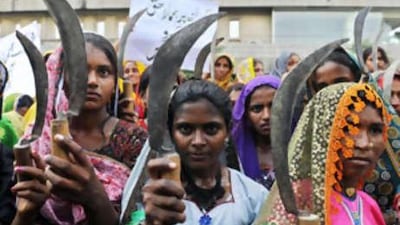ISLAMABAD // Pakistan's embattled government faces growing domestic anger over the country's economic crisis amid speculation that a bailout by the International Monetary Fund could lead to big cuts, including in defence spending.
With Pakistan, a key US ally, facing bankruptcy and with the stock market and rupee plummeting, the IMF revealed last week that Islamabad had sought politically unpopular financial assistance to cover a shortfall of US$4 billion (Dh15bn). But Pakistan may have to cut its defence budget by 30 per cent in the next four years under tough conditions imposed by the IMF, according to local newspaper reports, a move that would anger the military, which holds considerable sway in the country.
Ahmad Mukhtar, the defence minister, said he did not think such a cut would be "possible", but added that the defence sector was already facing a financial crunch because of the precarious economic situation. Cuts would also alarm the United States and other western allies, which regard the Pakistani military as central to shoring up Islamabad's wavering commitment to the "war on terrorism". "This is very unfortunate that we are again in need of IMF's financial support. We are in a weak bargaining position," said Salman Shah, the head of the finance ministry under the government of Pervez Musharraf, the former president and army chief.
Under previous IMF aid schemes to Pakistan, which ended only in 2004, tough spending cuts and tax hikes accompanied the economic aid, but the military budget was sacrosanct. The military has ruled the country for more than half of its existence, most recently under Mr Musharraf, and maintains a crucial behind-the-scenes role in its politics. Mr Musharraf resigned in August to avoid impeachment. His government oversaw years of growth, but handed down latent economic problems that the new government, led by the Pakistan People's Party, has failed to tackle.
"The government needs a very strong negotiating team because the IMF is known for putting up very tough conditions for loans," Mr Shah said. The economic meltdown has compounded the crisis over Pakistan's battle with al Qa'eda and Taliban militants based along the Afghan border, culminating in September's attack on the Islamabad Marriott Hotel. In a sign that the government is also losing support on this issue, a unanimous parliamentary resolution on Wednesday called for an "urgent review" of Islamabad's co-operation with Washington. Khurshid Ahmad, head of the Institute of Policy Studies in Islamabad, said Pakistan's continuing support for the "war on terrorism" had harmed the economy.
"Unless you come out of the so-called war on terror, the economic conditions will not improve," said Mr Ahmad, who is also a senator for Jamat-i-Islami, an Islamist political party. "I am deeply concerned over Pakistan's decision to approach the IMF. It is a development injurious to future growth and development of the country," he said. Shaukat Tarin, a Pakistani finance chief, has said the country needs up to $5bn to avoid defaulting on its foreign debts. Mr Tarin insisted that, despite the IMF's comments, Pakistan had not yet formally applied for its help. But IMF officials have said it could require between $10bn and $15bn over the next two years.
Meanwhile, appeals for aid by Asif Ali Zardari, the president, to China, Saudi Arabia and the United States have all come up with nothing. Analysts said Pakistan's largely impoverished 170 million inhabitants would bear the brunt of financial cuts under an IMF package. Pakistanis are already suffering from inflation of nearly 30 per cent on food and other essentials. A slump in the rupee's value against the US dollar of about the same amount has made imports, on which the country depends, more expensive. The IMF said Pakistan only had enough foreign currency reserves to cover six weeks of imports. "It will be hard to come up with the conditions of IMF because it will cause complications to the masses," said Mirza Ikhtiar Baig, a leading economist.
Mr Ahmad, the senator, said Pakistan's leaders should themselves bring foreign currency back to the country to try to avoid dependence on the IMF. "All politicians who have money in foreign banks, right from President Asif Ali Zardari, should forthwith bring it back," he said. * The National

